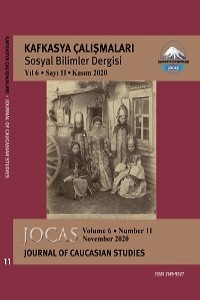Çerkes Diasporasında Mitolojik Anlatı: Korunabilirlik, Anlambilimsel-Faydacı Yaklaşım
Mitolojik anlatılar, bilindiği gibi, etnik kültürel hafızayla derin bağı olan metinlerdir. Aynı zamanda, dünya dinlerinin etkisi altında Hıristiyanlık ve İslam öncesi arkaik inançlar yavaş yavaş pasif hafızaya itilirler. Epik mitoloji metinleri Çerkes diasporasının folklor alanında sözlü metinlerin nispeten küçük bir bölümünü oluştururlar. Bunun nedeni Nart epik geleneğinin genel olarak sönümlenmesi, profesyonel anlatıcıların sayısının azalması olarak gösterilir, ki bu tarihi vatanda, Kafkasya’da da öyledir. Çerkes diasporasının folklor repertuvarında, yerel geleneklerin farklılığına da bağlı olarak, güncel mitolojinin sözlü metinleri çok daha önemli yer tutar. Bunlar, mitolojik varlıklar (iblisler, ruhlar) hakkındaki öyküler, ritüel-mitolojik öğütler ve tabulardır. Yazar kendi alan çalışmalarına dayanarak Türkiye Çerkes diasporasının folklorunda mitolojik anlatıların korunabilirlik sorunlarını, varoluş biçimlerini ve üstdil özelliklerini inceliyor. Uzunyayla bölgesinin kültürel geleneğinde varlığını sürdüren metinler, sabit şeması Kafkasyalı araştırmacılar tarafından çizilen “ortak Çerkes” geleneğine göre analiz ediliyor. Makalede metodolojik tasvir ilkeleri ve güncel mitolojik kişiliklerin eşleştirilmesi üzerinde duruluyor, sözlü mitolojik öykülerin sembolik ve sosyal-faydacı işlevlerinin analizi yapılıyor.
Anahtar Kelimeler:
Çerkes, diaspora, anlatı, anlambilim, mitoloji
Mythological Narrative in Circassian Diaspora: Preservation, SemanticPragmatic Aspect
As is known, texts of mythological narratives are closely linked to ethno-cultural memories. At the same time, the archaic, pre-Christian and pre-Islamic thoughts tend gradually to be pushed into the passive memory under the pressure of monotheistic religions. Epic mythological texts – the cosmogonic and ethnogenic ones – constitute a rather small corpus of oral texts within the folklore of the Circassian diaspora. This can be explained by the overall disappearance of Nart Epic tradition itself and the decrease in the number of professional narrators, not only in the diaspora but also in the ethnic homeland - the Caucasus. Oral texts of actual mythology - stories of mythological creatures (demons and ghosts), ritual-mythological instructions and taboos take up a considerable place in the folk territory of different local traditions of Circassian diaspora. This article investigates the problems of maintenance, forms of existence and meta-language peculiarities of mythological narratives in the folklore of the Circassian diaspora in Turkey through the observations the present author has made in her field trips to Turkey. The texts that have survived in the local cultural traditions of Uzunyayla, a plateau which is located between the Central Anatolian towns of Kayseri, Sivas and Maraş and is home to a relatively high number of Circassian, are analyzed within the framework of "common Circassian traditions” as defined by Caucasian researchers. Attention also has been paid to the principles of methodological description and the cartography of characters of actual mythology, and the symbolic and socio-pragmatic functions of oral mythological stories are analyzed.
- ISSN: 2149-9527
- Yayın Aralığı: Yıllık
- Başlangıç: 2015
- Yayıncı: Murat TOPÇU
